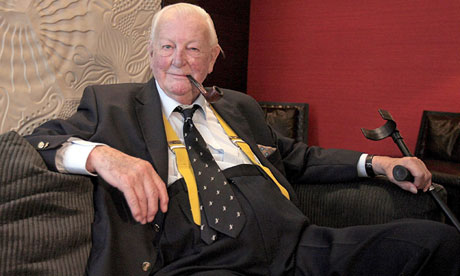After the news of Tom Sharpe's death at the age of 85, Charles Nevin looks at the past, and future, of campus fiction

Tom Sharpe: 'the master of situations that couldn’t possibly get any more embarrassing, sensitive or tricky, but did'. Photograph: Julian Martin/EPA
Scabrous, savage, scatological, writer of high force and low farce, creator and inflator of wayward condoms and threatening sex dolls: Tom Sharpe was the master of situations that couldn't possibly get any more embarrassing, sensitive or tricky, but did. Sharpe was never one for holding back, as his first novel, Riotous Assembly, featuring, among much else, apartheid, an elephant gun, murder, incompetent policemen and interracial lesbianism, triumphantly demonstrated.
But he will, I suspect, mostly be remembered for his rompingly entertaining tales of weak and well-intentioned innocents caught between the established order, empty innovation, venal ambition and unselfconscious egotism, placed in their ideal setting: a college campus. Henry Wilt at the Fenland College of Arts and Technology; Lionel Zipster at Porterhouse College, Cambridge: good weeds in a naughty world.
It was Sharpe's debt to Kingsley Amis's Lucky Jim and coincidence with the similarly staged novels of Malcolm Bradbury and David Lodge that earned him a place with them at the high table of a school that was becoming known as "campus fiction" and has continued ever since.
Lately, though, there has been an increasingly eager inclination in Britain to write it off, aided by the age of its most readily identifiable works, Sharpe's among them, and a lack of interest among younger people in them. Certainly, Sharpe's later work in other settings didn't attract quite the same approval or interest (although they still sell and, like the Wilt series and Porterhouse Blue, will doubtless be given a melancholy fillip by his death).
There is, as ever, some dispute about the definition of the category and nominees: Sharpe's stuff is considered by some a bit too Carry On Up the Campus. That, however, might also be said of the carryings on of the two Oxford students in The Miller's Tale. Whatever, Lodge, now 78, is generous: "There's a broad farcical element in his work, but it has a family resemblance to novels set in universities dealing with the relationship between staff and students."
More
But he will, I suspect, mostly be remembered for his rompingly entertaining tales of weak and well-intentioned innocents caught between the established order, empty innovation, venal ambition and unselfconscious egotism, placed in their ideal setting: a college campus. Henry Wilt at the Fenland College of Arts and Technology; Lionel Zipster at Porterhouse College, Cambridge: good weeds in a naughty world.
It was Sharpe's debt to Kingsley Amis's Lucky Jim and coincidence with the similarly staged novels of Malcolm Bradbury and David Lodge that earned him a place with them at the high table of a school that was becoming known as "campus fiction" and has continued ever since.
Lately, though, there has been an increasingly eager inclination in Britain to write it off, aided by the age of its most readily identifiable works, Sharpe's among them, and a lack of interest among younger people in them. Certainly, Sharpe's later work in other settings didn't attract quite the same approval or interest (although they still sell and, like the Wilt series and Porterhouse Blue, will doubtless be given a melancholy fillip by his death).
There is, as ever, some dispute about the definition of the category and nominees: Sharpe's stuff is considered by some a bit too Carry On Up the Campus. That, however, might also be said of the carryings on of the two Oxford students in The Miller's Tale. Whatever, Lodge, now 78, is generous: "There's a broad farcical element in his work, but it has a family resemblance to novels set in universities dealing with the relationship between staff and students."
More

No comments:
Post a Comment